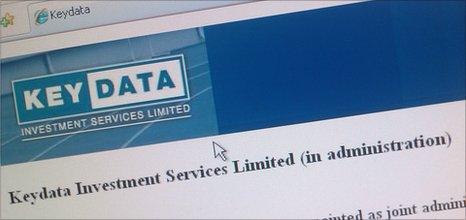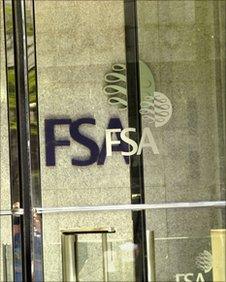Keydata: the first answers from the boss, Stewart Ford
- Published

Stewart Ford, the owner of Keydata, lives in Geneva and has been keeping a low profile for the past year since his firm was closed down by the UK authorities.
He argues that he has been obliged to keep quiet because of the continuing investigation by the Financial Services Authority (FSA) into what happened to the £450m invested by nearly 30,000 of his customers.
The authorities are looking into how £103m disappeared in a fraud at a Luxembourg company - SLS - whose policies he sold to 5,500 UK customers.
Meanwhile about £350m is still in limbo at another Luxembourg firm - Lifemark - whose polices he sold to another 23,000 clients.
Despite being reluctant to speak directly, his spokesman - Jack Irvine - has answered some questions put by the BBC.
Tax-free?
Firstly, Mr Irvine said it was never the intention of Keydata to publish any misleading material to its investors, such as the claims that the polices they bought - the so-called "death" bonds - would be classified as tax-free individual savings accounts (Isas).
"It was Keydata's understanding that these investments would qualify as Isas provided they were listed on the relevant exchange within the term of the bonds," Irvine said.
"Keydata would have discussed the matter of the interpretation of the Isa regulations further with HM Revenue & Customs (HMRC) had the FSA not intervened to force the administration of Keydata.
"This FSA intervention prevented the then management of Keydata pursuing those discussions with HMRC and resolving the Isa issue with HMRC," he added.
KPMG and HSBC
What about the erroneous references in the Keydata marketing literature to the involvement of accountants KPMG and the bank HSBC in designing the "death" bonds?
Irvine says Keydata was simply repeating claims made by a previous distributor of the SLS bonds.
"This marketing literature was shown to Keydata in May 2005 before it started its due diligence process into whether it should also market SLS bonds," said Irvine.
"As part of that subsequent due diligence process Keydata received assurances that the representations made in [the] marketing literature were correct," he added.
David Elias
Why was some of Keydata customers' money channelled to SLS at all, when it was controlled by a fugitive and bankrupt - the now dead David Elias?
"When Keydata and Mr Ford met with Mr Elias in 2005, it was not known that he was either a fugitive or a bankrupt," Irvine explained.
He said Keydata sold the SLS bonds to customers between July and December 2005, at which time Elias did not own or control SLS.
Elias only took over SLS in September 2007 from another firm CRT.
"As a result of this transaction, David Elias was able to assume overall control of SLS through the companies controlled by him," Irvine said.
"This was nearly two years after Keydata paid any monies to SLS for the bonds it had issued in 2005."
Investigations
Since Keydata was closed down in June 2009, some of the investors who lost money have been questioning the role of the authorities.

The FSA had been taking an interest in Keydata since 2005
The FSA had been looking into Keydata since 2005, and since PricewaterhouseCoopers were appointed as administrators of the firm last year the Serious Fraud Office (SFO) has become involved.
None of these organisations appears close to publishing any conclusions.
Peter Magowan of the Keydata victims action group thinks the FSA in particular could have acted much more quickly.
"They wrote to Keydata in 2007 formally commencing investigations," he says.
"This was 24 months after they received notification from KPMG and HSBC; during that time we had hundreds of millions of pounds of UK investors' money piling into this company."
The FSA enquiries
The FSA's original interest had been triggered by complaints about the misleading promotional literature which mentioned KPMG and HSBC.
The FSA says that it is not uncommon for mistakes or misleading tatements to be made in financial marketing literature and it dealt with 450 such problems in 2009.
However it believes Keydata's mistakes did not necessarily indicate that other problems might be in the offing, such as the fraud at SLS in Luxembourg.
"We identified and dealt with problems found in some of Keydata's financial promotions," the FSA said.
"Separately we also uncovered wider issues at the firm and acted quickly to protect investors - referring the tax issues to HMRC and potential missing funds to the Serious Fraud Office.
"As soon as it became clear that Keydata was going to breach our regulatory requirements we applied to put into administration to protect its investors," the FSA added.
Fraud enquiry
The SFO started taking an interest in SLS last summer when the disappearance of £103m of Keydata money first emerged.
It is now paying close attention to the management of Keydata and Lifemark, of which Ford was also a director.

Luxembourg, destination for most of the Keydata money
"The SFO is now also investigating the activities, control and ownership of Lifemark, and the activities of Keydata in marketing and selling products underpinned by bonds issued by Lifemark," the SFO said earlier this year.
Has there been any progress?
"We are still in the process of gathering evidence and interviewing witnesses," an SFO spokeswoman told the BBC.
As to SLS, in April this year the SFO said it had "not traced the ultimate destination of all SLS funds but a sizeable proportion of funds has been traced."
"The SFO has received some assistance from overseas in relation to SLS and its assets and expects to receive further assistance," it added.
This holds out the hope that some of the assets stolen by Elias may be recovered.
'Aggressive action'
Ford firmly blames Elias for the fraudulent losses at SLS.
"Mr Elias [was] able to manoeuvre himself into a position to control SLS... so that he could misappropriate the assets and extract the proceeds of their sale from the SLS bank account," said spokesman Jack Irvine.
But what about the current problems at Lifemark, which paid him millions of pounds in commission?
Irvine argued that it was the "aggressive action" of the FSA in closing down Keydata that has put its customers' Lifemark funds at risk.
"The reason that Lifemark is in limbo is because of regulatory intervention mid-term through the life cycle of products designed and set up to go through their full term before investors monies can be returned to them," Irvine said.
"The need to stay invested throughout the full term of the product was fully disclosed to investors before they agreed to invest on those terms.
"The Lifemark products had been on track to produce the investment returns as promised to investors before the regulators intervened," he added.
- Published17 June 2010
- Published16 June 2010
- Published21 May 2010